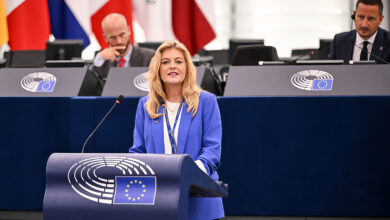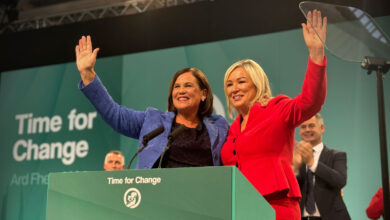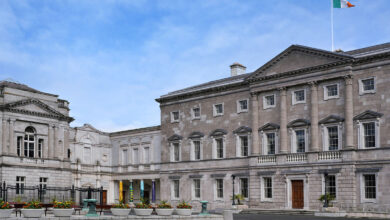‘Players and crap-hats’
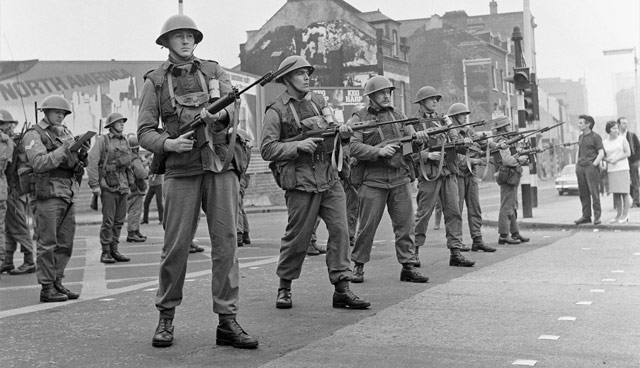

The deployment of militarily aggressive British Army units to Northern Ireland – bristling with experience of colonial counter-insurgency tours in Aden, Cyprus, Kenya and Malaya – coupled with an unwillingness of the upper echelons to punish serious transgressions, created an ambiguity which proved counterproductive to the overall military strategy. Edward Burke, author of An Army of Tribes: British Army Cohesion, Deviancy and Murder in Northern Ireland, writes.
In the coming weeks a number of former soldiers from 1st Battalion, the Parachute Regiment (1 PARA) may be charged over their alleged roles in the fatal shooting, and subsequent cover-up, of 14 unarmed protesters on ‘Bloody Sunday’. Although others, including Lord Saville in his 2010 report into the killings, have criticised officers for their roles on the day of the shootings, it is overwhelmingly ordinary soldiers, not officers, who are under investigation by the PSNI.
A soldier’s unique professional vocation is the application of violence. A commissioned officer is expected to manage, direct and limit that violence. That is why officers are expected to hold higher qualifications and undergo longer training before deploying operationally. It is they who administer punishment and ensure their soldiers’ actions meet the rigorous expectations to adherence to the law and the values of the State. At the operational level, non-commissioned officers – those who hold the ranks of sergeant-major, sergeant or corporal, for example – are also critical ‘reality-constructors’ when it comes to setting expectations and group understandings of tasks and expected behaviour. As one veteran observed during the course of my research for An Army of Tribes, a deviant but charismatic sergeant could ‘ruin’ a group of soldiers in weeks, as young soldiers began to emulate him.
The Canadian anthropologist Donna Winslow has described ‘hyper-investment’ or deviancy in the military as a situation where, “unit pride can become so exaggerated that one only respects the members of one’s unit, ignoring and sometimes resenting those outside the group. What is clearly an effective and necessary attitude [small unit cohesion] for the battlefield can then become an exaggerated force which undermines good order and discipline”. Fuelled by resentment and consumed by an immediate threat, a group could construct their own ‘micro-ethics’ or justification for ‘hitting back’, beyond the role and rules to which they were expected to adhere.
1 PARA suffered from ‘deviant cohesion’. It was a physically élite but overly aggressive unit unsuited to the low-intensity, aid to the civil power, campaign waged by the British Army in Northern Ireland. Such behaviour was not new. During the 1960s, the soldiers of 1 PARA had deployed as part of the UN peacekeeping mission to Cyprus in 1964 and to Aden Crown Colony in 1967. A 1 PARA officer, Brigadier Joe Starling later recalled the contempt his men had for other units, particularly the Irish Guards in Aden and the Irish Army who also served in the UN in Cyprus (1 PARA had a strong contingent of ‘confirmed Ulstermen’ within its ranks).
“As in Aden, in Northern Ireland many soldiers divided infantry regiments into ‘Players’ and ‘Crap-hats’. ‘Players’ were aggressive regiments who were willing to bend, or even break, the rules in order to get the job done.”
Starling also recalled that when 1 PARA interrogated prisoners in Aden, frequently in the basement of the Chartered Bank building, they were often tortured. Aden Brigade Headquarters were determined to clamp down on such behaviour: “It was made quite clear that if any more prisoners were shot ‘trying to escape’ or damaged by ‘accidentally falling downstairs’ a full investigation would be initiated, from which, it was hinted, dire consequences would follow.” Eventually Starling’s battalion resorted to simulating torture, threatening prisoners with medical sterilisation, a process that Starling believed yielded excellent results. A number of soldiers from Support Company, 1 PARA – responsible for much of the shooting on Bloody Sunday – served in Aden.
In 1972, Starling went on to serve as deputy commander of 3rd Infantry Brigade, which was responsible for security along the border. His old unit, 1 PARA, served in Northern Ireland from 1970-1972 as a resident battalion, called upon to reinforce trouble spots as required. Northern Ireland was a very different conflict to the colonial counter-insurgencies fought by the British Army during the preceding two decades. The use of tactics such as the forced transfer of populations or ‘villagisation’, the introduction of ‘free fire zones’ etc., was not possible in the UK. Other counter-insurgency tools such curfews and internment proved politically disastrous and were later abandoned as the Army struggled to adapt to operating ‘at home’. As in Aden, in Northern Ireland many soldiers divided infantry regiments into ‘Players’ and ‘Crap-hats’. ‘Players’ were aggressive regiments who were willing to bend, or even break, the rules in order to get the job done. 1 PARA saw itself as a ‘player’ unit.
Nationalist Derry was not alone in its contempt for 1 PARA. Residents of the Shankill Road complained that soldiers from 1 PARA had ‘executed’ Robert Johnston during clashes between Loyalists and the British Army. On the night of 7 September 1972, Robert Johnston was drunk, wandering up Berlin Street, when he encountered a group of soldiers.
One witness described what happened: “I went out to see what was happening. I saw the man shouting down at the troops at the bottom of Berlin Street on the Shankill Road. The words I heard him say were, ‘I run about [these streets] in my bare feet thirty years ago … The weak shall inherit the earth.’ Then he was shot.”
Another resident of the Shankill Road recalled soldiers driving around the area shouting: “Come out and fight like men you Orange bastards, we f***** your wives and daughters and now we will kill you, take down your Union Jacks, you’re nothing but a lot of Irish bastards.” Residents of the Shankill Road were afraid and outraged; some demanded that 1 PARA’s removal from Northern Ireland.
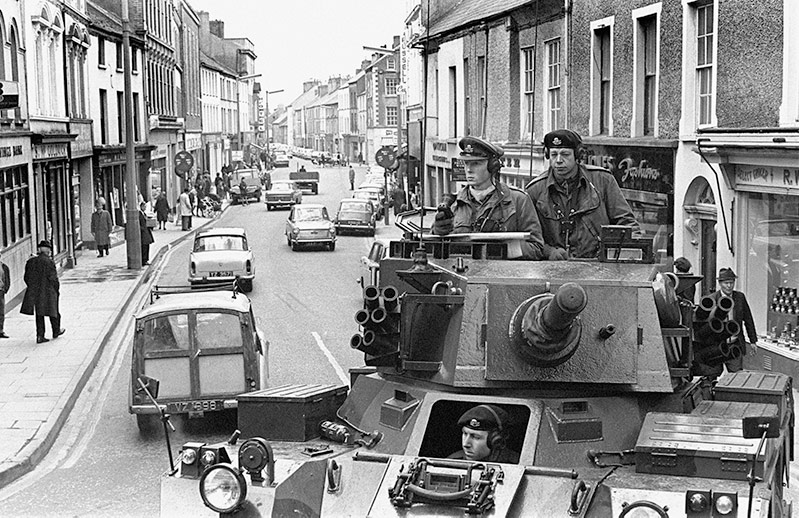
Loyalists were not alone in questioning the negative relations that had built up between individual regiments and the local populace. In 1975, the Northern Ireland Office asked the Ministry of Defence to consider the “habits and traditions of individual battalions” in order to see whether they were suitable for service in Northern Ireland. The most senior officer in Northern Ireland, General Harry Tuzo, was also worried about increasing incidents of commanding officers covering up the misdeeds of their soldiers so as to not embarrass their regiment, a misplaced loyalty of, ‘My soldiers right or wrong’. But he did little to act upon his concerns. Even in an incident where wrongdoing had, according to Tuzo, undeniably taken place – the abduction and severe beating of two Legion of Mary workers, Raymond Muldoon and Francis Creagh, by soldiers from 1 PARA on 3 February 1972 – Tuzo’s wrath focused on the victims, Muldoon and Creagh, because they did not seek Army or RUC assistance to investigate their allegations. “One is forced”, Tuzo wrote, “to the conclusion that they are more interested in propaganda than in the redress of grievance.”
Restraint, the management of violence – the particular vocation of a commissioned officer – was too often absent in ‘player units’ during the early 1970s. Very few soldiers were prosecuted for offences committed in Northern Ireland between 1969 and late-1972. In 1970, the Army concluded an agreement with the Chief Constable of the RUC on the investigative process that should be followed if allegations of misconduct were made against the Army. The Army alone would interview military witnesses, and the RUC would speak to civilians. Only a handful of cases ever made it to court; this was a ‘honeymoon period’ for the Army, compared with the more rigorous approach adopted in later years. The failure of the Royal Military Police Special Investigation Branch to conduct what it called ‘normal standard’ investigations in Northern Ireland in the early 1970s also led to confusion over what was acceptable behaviour among soldiers.
Successive governments also failed to respond to complaints of army excesses; pre-existing and complacent notions of inherent Irish dishonesty meant the Government consistently dismissed complaints of abuse in Northern Ireland. Much of the Catholic population in Northern Ireland came to believe that London either deliberately encouraged such behaviour or failed to prevent and investigate it. Both conclusions were highly damaging for the Army and for British strategy in Northern Ireland.
Profile:
 Dr Edward Burke is Assistant Professor in International Relations at the University of Nottingham. ‘Army of Tribes: British Army Cohesion, Deviancy and Murder is published in paperback by Liverpool University Press.
Dr Edward Burke is Assistant Professor in International Relations at the University of Nottingham. ‘Army of Tribes: British Army Cohesion, Deviancy and Murder is published in paperback by Liverpool University Press.

